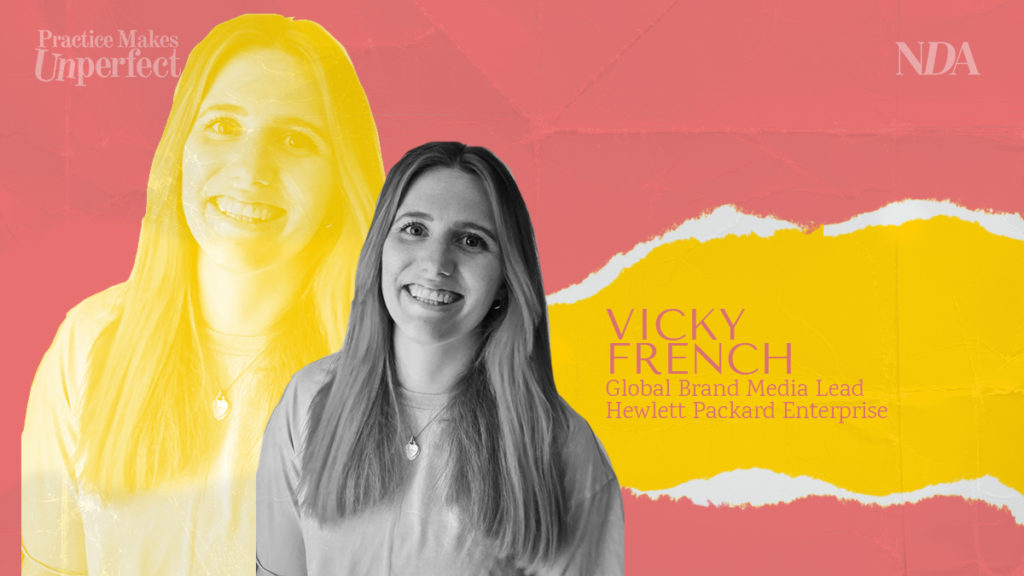Vicky French, Global Brand Media Lead, Hewlett Packard Enterprise
These articles have been written by the latest cohort of the Practice Makes UnPerfect programme – a course that helps women find and finesse their public voices
The majority of brands are huge, fucking, hypocrites. They pump money into publications that fuel sexism, racism, ableism, homophobia, transphobia, fatphobia, toxic masculinity, the women vs. women narrative and frankly, anything that is anti-diversity and/or can negatively impact a person’s mental health.
These are the same brands that post on social media in support of Mental Health Awareness month, International Women’s Day and Pride (as some examples), and then place ads on the Daily Mail against content that incites hateful comments that are not only discriminative but damaging to people’s mental health.
We’re advertising in ways that aren’t sustainable (I’m looking at you as you drink from your non-recycled plastic water bottle: the latest swag you picked up from an event). What about the 182 pens you’ve acquired, lost and have probably made their way to landfill? How many leaflets, printed infographics, plastic that’s wrapped around something else you’re never going to use have you picked up from brands that have also shared tips on fighting climate change?
We edit stories so they seem like they’re supporting important societal issues, but really we’ve edited out the most provocative parts, just in case it harms our reputation. We quieten the voices that are too controversial, even if they’re on the right side of being able to drive change.
Take Munroe Bergdorf as an example, who was fired from L’Oreal back in 2017 for speaking out about racism and white supremacy: her voice was too much. Last year when the Black Lives Matter movement was accelerating and L’Oreal shared messages of support, she accused them of performative social media. How could they be anti-racist and in support of Black Lives Matter if they fired her years earlier for having that conversation? Fortunately, in this case, L’Oreal did apologise and seek to right their wrong and asked Munro Bergdorf to join their board for Inclusion & Diversity. The problem is, this is only one very highly publicised case. I wonder how many stories are there where the ending isn’t quite as good because they didn’t garner any media attention.
We’re still fostering environments where women still don’t feel safe at work. Zoe Scaman recently published an article exposing the huge amounts of sexual harassment in the advertising industry. Within the article, she tells how between her and the women that shared their stories, they can name at least eight men who are in very high profile positions that try to cover up harassment claims, don’t fight the gender pay gap and punish women who are pregnant. These men are also outwardly advocating for inclusion & diversity. How can advertising agencies and brands responsible for some of the biggest inclusion and diversity campaigns, have misogyny, harassment and assault rooted in their core?
But we’re more powerful than we think. According to the Edelman Trust Barometer (2021), 62% of people believe that employees have the power to force corporations to change and 50% of those who are employed, reckon they’re more likely to engage in a workplace protest or voice their objections to management (more so than they were a year ago).
So really it’s down to me, you and our colleagues to use our voices. But what happens when those voices are silenced? What happens when the organisations that are supposed to support you, don’t? What happens when the very industry responsible for the outward messaging in support of important societal issues is the most corrupt?
That’s where we are today. Whilst businesses are leaning into leading with purpose: campaigning for mental health; championing diversity and inclusion, or promoting sustainability; the culture of the teams responsible for putting these messages into the market is broken. The actions of these teams are not synergistic with the messaging they’re putting out into the world. We’re not providing the space for people to advocate for change for the fear of being too much or hurting someone’s (normally a man’s) feelings.
So what do we do? We need an independent governing body that fact-checks the CSR related messaging that is going out in the world and that verifies a company’s actions are in line with their messaging. We need an independent body for employees to turn to when their HR departments are failing them. We need an independent governing body that calls out the hypocrites and delivers consequences to them in a way that will force change in behaviour.
How much more productive would it be if every company that has an advert appearing next to comments on the Daily Mail that are outright racist, yet partakes in exhibitionist social media for Black History Month or during Black Lives Matter protests, gets fined X% of their profit for being a hypocrite and that money goes towards a non-profit like Show Racism The Red Card? How empowering would it be to find that a company that advocates for gender equity, is headed up by a multi-time accused sexual predator, is fined X% of their profits, with the money going to Survivor UK?
Money talks. Reputation talks. This is what this industry needs, we just need to figure out how to operationalise it.









